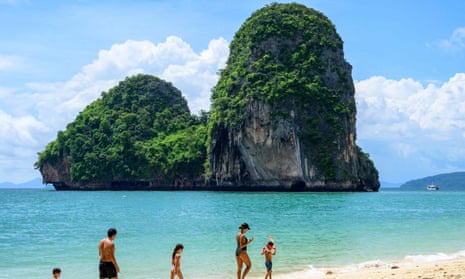Thailand has opened its borders to vaccinated travellers from more than 60 countries , the largest restart of tourism yet in south-east Asia where borders have mostly remained shut throughout the pandemic.
Starting on Monday, Thailand is allowing visitors from 63 countries to visit without the need to quarantine.
It is hoped the measure, announced just ahead of the peak tourism season, will revive the country’s ailing travel sector, which once contributed as much as 20% of GDP. The list includes China, the US, European nations such as the UK, and many neighbouring countries.
To visit the country, tourists will need to be fully vaccinated, test negative for Covid before and after arrival, and spend their first night at a hotel that meets government requirements. They will also need to have Covid insurance cover of at least $50,000 (£36,600).
Announcing the reopening last month, Thailand’s prime minister, Prayuth Chan-ocha, said that as other countries, such as the UK, Singapore and Australia, relaxed travel restrictions on their own citizens, Thailand “must act quickly but still cautiously” to entice potential visitors. The UK recently removed all countries from its travel red list.
Marisa Sukosol Nunbhakdi, the president of the Thai Hotels Association, said the reopening was the first step on the road to recovery for the country’s tourism industry. She said: “It’s been long overdue for hotels. We have been closed for so long. If this [closure] was extended further the industry would probably collapse – not the entire industry but definitely the hotels that are lacking in cashflow.”
“Even now few hotels have enough cashflow to reopen and the staff that are still onboard are not fully paid, they’re working part-time,” she said.
About half of the country’s hotels have been closed during the pandemic, according to the Thai Hotels Association, and it is unclear how many will reopen. The restaurant and nightlife sectors have also been badly hit by the fall in visitor numbers and tough Covid-related restrictions, including an alcohol ban that has recently been eased. On Monday, it was announced that approved restaurants in Bangkok would be permitted to serve alcohol until 9pm, but that bars and clubs in the capital would remain closed.
Chob Panma, the owner of Thai Tour Guide company, said the past 18 months had been painful for the tourism-reliant businesses. “It’s been quiet – by quiet I mean dead. There were no jobs,” he said. He is excited the country is finally reopening, but unsure of how many people will be able to afford to travel. “This is a problem around the world. It’s not only our country, but their country has problems too,” he said, referring to the economic impact of Covid.
Last year, when Covid brought travel to a standstill, the country lost about $50bn (£36bn) in revenue, as well as millions of tourism-reliant jobs.
Thailand, which has kept strict restrictions on its borders, managed to control Covid for much of 2020 but was unable to contain the Delta variant, which caused a rise in cases in August that overwhelmed hospitals. Prayuth has since said the country must learn to live with Covid.
Just over 40% of Thailand’s population is fully vaccinated, though rates are higher in areas such as Bangkok, which was prioritised by the government.
Gary Bowerman, the director of Check-in Asia, a travel consultancy firm, said Thailand’s reopening was a major development in south-east Asia. “Other [neighbouring] countries will simply want to keep pace,” he said. But he added that Thailand’s visitor numbers were likely to remain far lower than in pre-pandemic times, especially given that China, normally a major source of tourists, has strict rules that discourage citizens from going abroad.
Travellers who do visit Thailand also need to deal with new bureaucratic barriers, including Covid tests and extra insurance requirements, he added. “We were really used to being able to book and go. For a long time that’s not going to happen.”
